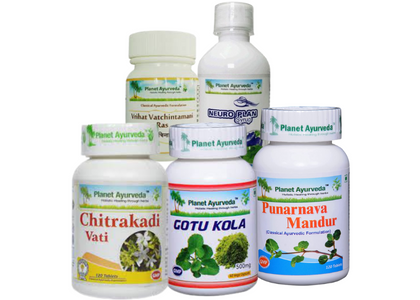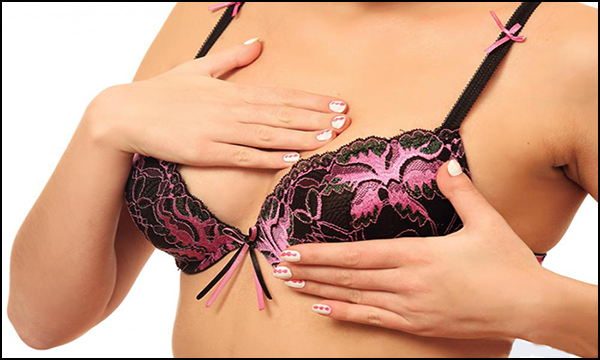Central Pontine Myelinolysis its Treatment with Ayurveda
ABSTRACT
Central pontine myelinolysis is a neurological condition which is observed in 29% of the liver transplant patients as suggested by a study through post mortem examination. The exact incidence of central pontine myelinolysis is yet not reported. It is related to the imbalance of levels of sodium present in the body. Central pontine myelinolysis occurs very frequently in cases that undergo a rapid medical correction in the sodium levels. Let’s discuss it in detail!

INTRODUCTION
Central pontine myelinolysis is a neurological disorder. Pontine in Central pontine myelinolysis means related to pons (i.e. a part of the brain). Myelinolysis refers to the damage of the myelin sheath of the nerve cells. Central pontine myelinolysis as a combined term refers to the degeneration of myelin sheath of the nerve cells in the specific area of the brainstem known as pons. This condition is most frequently reported due to iatrogenic causes (i.e. the conditions that arise due to some medical treatment or procedure). Central pontine myelinolysis is usually seen in patients who were once reported to be hyponatremic (i.e. low sodium levels) and were administered sodium too rapidly. This leads to osmotic imbalance in the body hence resulting in the body’s overall diminished health.
CAUSES
The most common cause of Central pontine myelinolysis is too rapid correction of the hyponatremic (decreased levels of sodium) state of the body. The patients undergoing dialysis and the burn victims are at a higher risk of landing in this condition. The exact cause is still not known yet. Central pontine myelinolysis is seen more frequently in the hyponatremic patients that are suffering from AIDS/ HIV, malnutrition, hypokalaemia (decreased levels of potassium) etc. It is seen that chronic alcoholism makes the person more prone to CPM (Central pontine myelinolysis). The patients suffering from anorexia, electrolyte imbalances and various types of liver disease are more prone to this condition. The pregnant women suffering from hyperemesis gravidarum are at higher risk of suffering from Central pontine myelinolysis.
SYMPTOMS
The symptoms of Central pontine myelinolysis will depend on the region and proportion of the region involved. The various common features seen in these patients are vomiting, confusion, headache, seizures, etc. It may also lead to changes in gait, difficulty in speaking, frequent seizures etc. The patient may experience clouding of thoughts, confusion, and feels difficulty in accomplishing the assigned tasks. In the extreme stages of Central pontine myelinolysis, the patient may start experiencing the symptoms of parkinson’s disease.
DIAGNOSIS
The diagnosis of CPM (Central pontine myelinolysis) is made by observing both the clinical course as well as the laboratory investigations. The laboratory diagnosis will include MRI (magnetic resonance imaging) and other physiological examinations. The reports of cranial computed tomography are also observed to diagnose the condition properly. The MRI reports will help to demonstrate the areas of demyelinated nerve cells. However, the correlation between the clinical course and the laboratory reports are yet not established.
TREATMENT
The management of Central pontine myelinolysis mainly involves prevention. Prevention will include careful administration of saline for correction of hyponatremia (low sodium levels). It will also require supportive therapies.
COMPLICATIONS
The complications of Central pontine myelinolysis will depend on the case. Most common complications are muscle atrophy, aspiration pneumonia, ulcers, coma and can ultimately result in death.
AYURVEDIC ASPECT
The Central pontine myelinolysis can be correlated to vata vyadhi resulting from avrana dosha. More specifically, the first stage of hyponatremic encephalopathy can be correlated with Samana vata avruta vyana vata. The second stage will be correlated to sarvang vata with kapha avrata. Avrana is a very unique and wonderful concept in ayurveda. Avarana refers to enveloping or covering. The avarana of vata refers to enveloping of the free- flowing natural vata by any other element. These elements could be pitta, kapha, the dhatus (eg. Rakta, masa, meda etc) or the mala (pureesh, mutra, sweda).The avarana will result in presentation of various clinical features such as dourbalaya (weakness), guruta (heaviness), gati sanga (restricted movement). This condition will require the treatment of the avarana condition as well as the vata vyadhi chikitsa. This treatment will include various types of therapies such as udvartana, basti which includes anuvasana and niruha basti, etc.
HERBAL REMEDIES FOR CENTRAL PONTINE MYELINOLYSIS BY PLANET AYURVEDA
Planet Ayurveda is preparing various formulations of natural herbs such as Punarnava Mandur, gotukola capsules etc which are prepared through authentic ways and provide great results in improving the condition of Central pontine myelinolysis. All the herbal products manufactured here are free from chemicals, preservatives, starch, yeast, additives, colors and fillers. They are 100 percent natural and are formulated by MD Ayurvedic doctors with deep knowledge of Ayurveda and many years of experience. The formulations that improve the condition of Central pontine myelinolysis are as follows:
Products List
- PUNARNAVA MANDUR
- GOTU KOLA CAPSULES
- VRIHAT VATCHINTAMANI RAS
- CHITRAKADI VATI
- NEURO PLAN SYRUP
Products Description
1. PUNARNAVA MANDUR
Punarnava mandur is prepared from 100% natural extracts of a variety of beneficial drugs such as Boerhaavia diffusa (Punarnava), Zingiber officinale (Shunti), Piper longum (Pippali), Piper nigrum (Maricha), Emblica officinalis (Amalaki), Terminalia chebula (Haritaki), Piper chaba (Chavya), Curcuma longa (Haridra), Embelia ribes (Vidanga), Plumbago zeylanica (Chitrak Mool), Ferric oxide calx (Mandoor Bhasma). It helps in restoring the water and electrolyte balance of the body. It promotes the overall health of the body. It benefits the renal system.
Dosage: 1-2 tablets can be taken twice or thrice daily with lukewarm water.
2. GOTU KOLA CAPSULES
Gotu kola capsules are created from the pure extract of the herb Gotu kola (Centella asiatica). It will help to improve the blood circulation of the body. It is very beneficial for the neurological system of the body. It enhances the strength of the brain so helps in speedy recovery.
Dosage: 1-2 Capsules should be taken twice a day with plain water and after meals.
3. VRIHAT VATCHINTAMANI RAS
Vrihat vat chintamani ras is a mineral preparation created from a combination of various beneficial components such as Swarna Bhasma, Rajata Bhasma, Abhraka Bhasma, Loha Bhasma, Pravala Bhasma, Mukta Bhasma and Suta Bhasma. It will help to pacify the vata dosha from the body. It promotes the overall health of the body. It helps to get relief from various neurological conditions such as seizures, paralysis etc.
Dosage: Vrihat vat chintamani ras should be consumed as per the condition of the body and as per advised by the physician.
4. CHITRAKADI VATI
Chitrakadi vati is prepared from a combination of various components such as Chitrak (Plumbago zeylanica), Five salts (Pancha lavana) (Saindhava lavana, souvarchala lavana, vida lavana, samudra lavana, romaka lavana), Ginger (Zingiber officinale), Pipali (Piper longum), Pipar mool(Piper longum root), Heeng (Ferula asafetida), Chavya (Piper chaba), Ajmoda (Trachyspermum roxburghianum). These drugs are very effective in improving digestion. It provides various other health related benefits. It is known to pacify the vata dosha from the body.
Dosage: 1-2 tablets twice or thrice a day with lukewarm water.
5. NEURO PLAN SYRUP
Neuro Plan Syrup prepared by like Brahmi (Bacopa monnieri), Mandukaparni (Centella asiatica), Shankhpushpi (Convolvulus pluricaulis), Jyotishmati (Celastrus paniculatus), Ashwagandha (Withania somnifera), Bhojpatra (Betula utilis), Madhuyashti (Glycyrrhiza glabra), Sonth (Zingiber officinale), Maricha (Piper nigrum), Pippali (Piper longum), Honey and Sugar. It is known to improve the neurological strength of the body. It will improve the various brain related conditions such as insomnia, lack of concentration, paralysis, seizures etc.
Dosage: One or two teaspoons twice a day or as prescribed by the Ayurvedic Physician.
CONTACT PLANET AYURVEDA TO PROVIDE YOU THE COSTING / ORDERING AND DELIVERY INFORMATION AT – COSTING.PLANETAYURVEDA@GMAIL.COM OR CALL AT +91-172-5214040
CONCLUSION
The Ayurvedic principle of treatment emphasizes on treating the root cause of the condition hence eliminating the disease permanently. In a nutshell, it can be concluded that with appropriate and timely management, the patient suffering from Central pontine myelinolysis will be greatly relieved.




